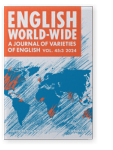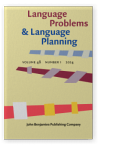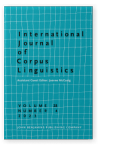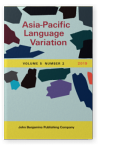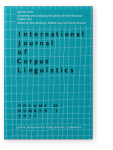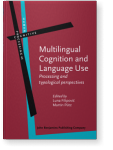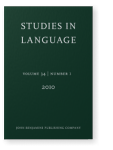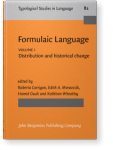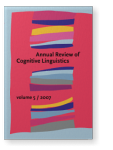Andreea S. Calude
List of John Benjamins publications for which Andreea S. Calude plays a role.
Journal
2024 Māori loanwords in New Zealand English: What can a picture-naming task reveal for language planning? Language Problems and Language Planning 48:1, pp. 48–74 | Article
The Indigenous language of ANZ, Māori is undergoing significant revitalisation, following severe loss of vitality caused by English colonialism. One dimension to this revitalisation is the normalising of borrowings from Māori into New Zealand English (NZE). However, there are currently no… read more
2023 When loanwords are not lone words: Using networks and hypergraphs to explore Māori loanwords in New Zealand English International Journal of Corpus Linguistics 28:4, pp. 461–499 | Article
Networks are being used to model an increasingly diverse range of real-world phenomena. This paper introduces an exploratory approach to studying loanwords in relation to one another, using networks of co-occurrence. While traditional studies treat individual loanwords as discrete items, we show… read more
2019 Detecting language change: Māori loanwords in a diachronic topic-constrained corpus of New Zealand English newspapers Asia-Pacific Language Variation 5:2, pp. 109–137 | Article
The borrowing of words from one language into another is most likely as ancient as language itself. While ample linguistic attention has focused on various linguistic contact scenarios in which words from one language enter productive use into another, their aim has been largely restricted to… read more
2017 Sociolinguistic variation at the grammatical/discourse level: Demonstrative clefts in spoken British English Compiling and analysing the Spoken British National Corpus 2014, McEnery, Tony, Robbie Love and Vaclav Brezina (eds.), pp. 429–455 | Article
This paper brings together the study of sociolinguistic variation and the area of grammatical analysis by investigating demonstrative cleft constructions in spoken British English such as That’s what I wanted to talk about and This is where I saw him. Using the Spoken BNC2014S, I ask whether… read more
2014 Frequency of use and basic vocabulary Multilingual Cognition and Language Use: Processing and typological perspectives, Filipović, Luna and Martin Pütz (eds.), pp. 45–72 | Article
We use corpora from 18 languages to study the frequency of basic words such as mother, sun, and red. We compare three lists, Swadesh-200, Swadesh-100, and the Leipzig-Jakarta list (Tadmor 2009), and find that they have a high average inter-correlation. Using the WOLD semantic categories and fields… read more
2011 Inferentials in spoken English Pragmatics 21:3, pp. 307–340 | Article
Although there is a growing body of research on inferential sentences (Declerck 1992, Delahunty 1990, 1995, 2001, Koops 2007, Pusch 2006), most of this research has been on their forms and functions in written discourse. This has left a gap with regards to their range of structural properties and… read more
2010 Review of Dehé & Kavalova (2007): Parentheticals Studies in Language 34:1, pp. 205–211 | Review
2009 Formulaic tendencies of demonstrative clefts in spoken English Formulaic Language: Volume 1. Distribution and historical change, Corrigan, Roberta, Edith A. Moravcsik, Hamid Ouali and Kathleen Wheatley (eds.), pp. 55–76 | Chapter
Despite having been noted as a frequent construction in spoken language, little has been said about the demonstrative cleft. Clefts such as that's what I am talking about, or that's what I mean, are not entirely fixed in their structure; however, they do exhibit recurring patterns and “preferred… read more
2007 Light and heavy reflexive marking: The Middle Domain in Romanian Annual Review of Cognitive Linguistics: Volume 5, Ruiz de Mendoza Ibáñez, Francisco José (ed.), pp. 239–269 | Article
In Romanian, the middle marker se is employed to encode five distinct situation types: reflexive, reciprocal, (medio-)passive, inchoative and impersonal. This work identifies the relationships among the different uses of the marker and puts forward explanations for them within a cognitive,… read more
